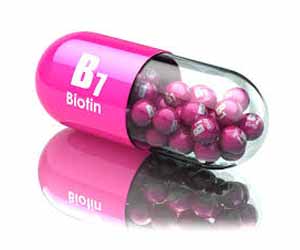- Home
- Editorial
- News
- Practice Guidelines
- Anesthesiology Guidelines
- Cancer Guidelines
- Cardiac Sciences Guidelines
- Critical Care Guidelines
- Dentistry Guidelines
- Dermatology Guidelines
- Diabetes and Endo Guidelines
- Diagnostics Guidelines
- ENT Guidelines
- Featured Practice Guidelines
- Gastroenterology Guidelines
- Geriatrics Guidelines
- Medicine Guidelines
- Nephrology Guidelines
- Neurosciences Guidelines
- Obs and Gynae Guidelines
- Ophthalmology Guidelines
- Orthopaedics Guidelines
- Paediatrics Guidelines
- Psychiatry Guidelines
- Pulmonology Guidelines
- Radiology Guidelines
- Surgery Guidelines
- Urology Guidelines
FDA updates safety warning about biotin interference with lab results

The U.S. Food and Drug Administration has updated its safety communication to remind the public, health care providers, lab personnel and lab test developers that biotin (vitamin B7) can interfere with lab tests, including those for troponin.
Biotin is a water-soluble vitamin often found in multivitamins, prenatal vitamins and dietary supplements marketed for hair, skin and nail growth. Many dietary supplements contain biotin levels up to 650 times the recommended daily intake of biotin.
The regulatory agency had first issued a warning in 2017. Since then, the FDA has continued receiving reports that biotin interference is resulting in falsely low troponin results. Some developers of lab tests have taken steps to account for biotin interference, but others have not. The FDA is calling out the specific manufacturers who have not yet addressed the interference issue (see second link below).
Adults' daily recommended allowance for biotin is 0.03 mg. Some supplements — which are marketed for improved hair, skin, and nails — contain 650 times the recommended daily allowance. Clinicians may also recommend high doses for conditions like multiple sclerosis.
The FDA is particularly concerned about biotin interference causing a falsely low result for troponin, a clinically important biomarker to aid in the diagnosis of heart attacks, which may lead to a missed diagnosis and potentially serious health implications.
The FDA has engaged with manufacturers to address the risk of biotin interference in their essays, and many test makers have taken steps to mitigate the issue. However, not all manufacturers have done so, which is why, in order to foster transparency and inform the public, the agency is releasing a list of troponin tests in the FDA’s listing database that have not yet mitigated the biotin interference risk. The FDA will continue engaging with manufacturers as they work to address this interference and will update the list of troponin tests subject to biotin interference as appropriate. Additionally, the agency is reminding patients and health care providers to discuss all supplement use. The FDA will continue to update the public if significant new information becomes available.

Disclaimer: This site is primarily intended for healthcare professionals. Any content/information on this website does not replace the advice of medical and/or health professionals and should not be construed as medical/diagnostic advice/endorsement or prescription. Use of this site is subject to our terms of use, privacy policy, advertisement policy. © 2020 Minerva Medical Treatment Pvt Ltd